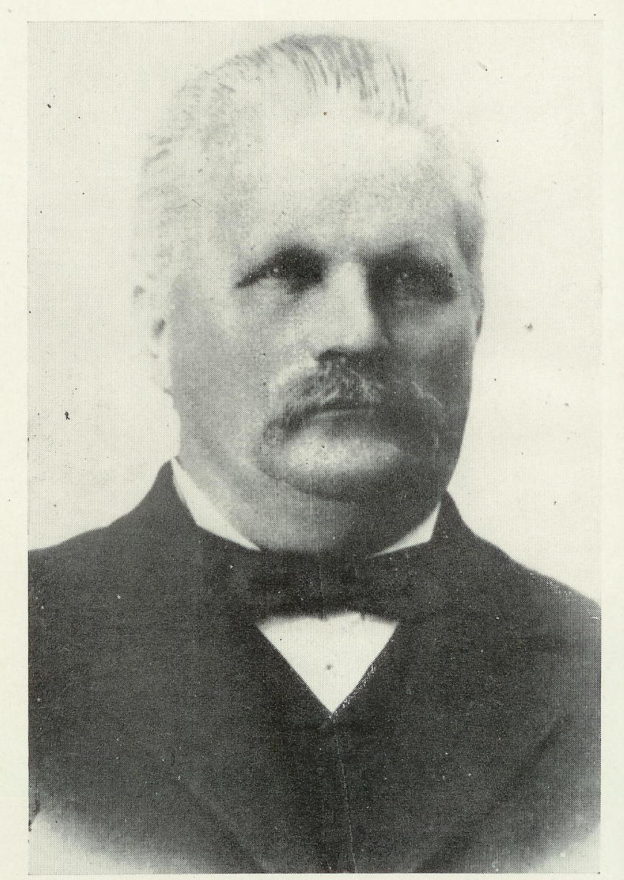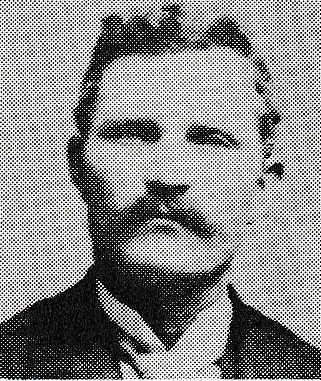Miles Park Romney
1843 – 1904
The family tree from which Miles Park Romney sprang had its roots planted in English soil centuries before the family came to America. They belonged to the middle class. Miles Romney, father of Miles Park, married Elizabeth Gaskell. Miles P. was the 5th child of seven children and 4th born to this couple.
Miles and Elizabeth, on their way to market, saw a group of people assembled on a street corner. They were curious as to what attracted the crowd. They discovered it was a religious gathering and that the preacher was a Mormon missionary from America. They learned later that it was Orson Hyde, an Apostle, to whom they had listened. This was in 1837. In September, 1839, Miles Romney, his wife and son George were baptized.
The family left England in 1841 to gather with the Saints in Nauvoo. It took 51 days to reach New Orleans. Miles Park Romney was born August 18, 1843, in Nauvoo, Illinois, a little less than one year before the martyrdom of the Prophet Joseph Smith and his brother, Hyrum. Three years after his birth, the Saints were driven from their beloved city.
Destitute, the family sought employment among strangers in three or four places, finally finding temporary employment in St. Louis, Missouri, where they remained until 1850. Then they were on the move again, this time to join the Saints in Salt Lake City, a distance of nearly 2,000 miles. The hardships and trials of this journey no doubt had a profound effect in molding the character of this lad. While a young, barefoot boy, he herded cows at the base of the Wasatch Mountains with other boys. One of them was Joseph F. Smith, who later became President of the Church.
Because of the need to help support the family, Miles P.’s education was neglected. He went to school but a few terms in his entered life. In fact, he never entered a schoolroom after he was 12. Yet, through his own efforts he became a well-educated man.
During the Johnston’s Army episode, he brother George was a captain among those sent by President Young to harass the federal army and keep them from entering the city. Miles P., only 14 then, had great aspirations for military service and followed his brother several miles up the canyon east of the city, much to his brother’s displeasure. No argument proved sufficient until Captain George thought of a scheme which worked. He wrote a letter President Young asking that the boy be kept home. He told Miles he had a special message for the President which should be delivered. Miles accepted the mission proudly, having no idea of the contents. He was kept home.
In those early days great stress was placed by President Young and other leaders upon the importance of early marriage. At one time President Young said, “Let every man over 18 years of age take a wife and then go to work with your hands and cultivate the land or labor in some mechanical business or some honest trade to make a living for yourself and those who are dependent on you for subsistence.” An ardent admirer of President Young, Miles P., at the age of 18, married Hannah Hill. Just three weeks after the marriage, Miles P. was called on a mission to the British Isles.
On April 9, 1862, he left and on the 26th day of July arrived in Liverpool. He labored first in the Manchester and London districts, and finally was made President of the Cheltenham Conference, a position he held until his release in April 1865. Miles P. had barley arrived in the mission field when called to speak. He stood faced the audience, but not one word could he say. He got up the 2nd time with the same result. He did not give up. The 3rd time words came haltingly from his quivering lips. The audience may not have been much enlightened, but they would not forget. The young missionary had achieved a victory that was of untold value to him in his ministry and throughout his life. His fluent speech and magnetic personality, with his implicit faith in the Gospel, contributed to his success as a missionary. During his mission he became very ill and was forced to go to a doctor, who told him he had but six months to live. But he did not give up. Every night he prayed that he might be able to complete his mission and return to his loved ones. His prayers were answered.
On the ship Belle Wood, on which he sailed for home, were a large number of Saints, organized into nine wards. Miles P. presided over one of them. In November 1865, on his return to Salt Lake City, he was greeted by his wife and daughter, Isabell, who was only two years old, and whom he had never seen.
In 1867 he entered plural marriage by taking to wife Carrie Lambourne. In October 1867, with 157 other heads of families, he was called to settle St. George, where he was employed as a skilled workman. He worked on the St. George Tabernacle which was completed in 1871. When it was decided that a temple should be built in St. George, his father, Miles Romney, was appointed to superintend the work. He was assisted by Miles P. On one occasion President Young in a public meeting thus addressed Elder Romney: “Brother Romney, would you like to go to Heaven?” The answer came, “Yes, Brother Brigham, I think I should like to go there.” “Then,” said President Young, “You must join the Order and take charge of all the building in southern Utah.”
On November 8, 1869, Miles P. was ordained a High Priest and set apart as a member of the High Council. In September 1873, he married Catherine Cottam in the Endowment House in Salt Lake City and again, scarcely four years later, he married Annie W. Woodbury. In 1875, he was called on a mission to the Northern States. Part of the time he was appointed to preside over the Mission. He was gone 10 months, and baptized 33 converts. On April 17, 1877, he was ordained Bishop of the St. George 1st Ward. He also served as Superintendent of the Sunday School and Stake Superintendent of the YMMIA. On September 15, 1878 he was release as Bishop as his request.
In 1881 he was called by the First Presidency to leave St. George and settle in St. Johns, Arizona. While there he acted as First Counselor to Bishop David King Udall and edited and published a newspaper. He was a member of Dramatic Association and leading contractor and builder in this area. But on account of trouble with land claim jumpers, and with the consent of the First Presidency, he returned with his plural families to St. George. There, political conditions made it necessary to leave that section of the country.
After only three weeks, he left with his wife Annie and her three children for Mexico. There they settled in Camp Turley on the Casas Grandes River, but moved with the camps to Old Town on the Piedras Verdes River and were among the first settlers of Colonia Juarez. On June 15, 1887, when the Juarez Ward was organized, he became First Counselor to Bishop George W. Sevey. One of his first cultural moves in this new community was to organize a Dramatic Association. He was fresh from St. George where, according to reports, he “bestrode the theatrical world like a giant colossus.” He was eager to reproduce some of his successes. He wanted to set a standard for excellence in play production and introduce refugee settlers to a high standard of entertainment.
He and his boys made a stage for his plays. On it were presented high classed dramas to an appreciative audience, the climax of which was Othello, in which he played the leading role of the swarthy Moor, a crowing to previous roles he had directed and acted. He was ever the actor, rising to heights of oratory on patriotic occasions, thundering Gospel and moral teachings from the pulpit, dramatically acting as Marshal of the Day for national celebrations. He led parades with plumes waving and sword flashing with military precision, and all done so enthusiastically that one was to wonder if the occasion was created for him, or was he created to make the occasion something special. The fruits of his efforts are still alive in posterity rich with public speakers, dramatic coaches and play readers, all bordering on the professional. All point back to his reverence for the spoken word and his love for pu0re undefiled speech.
Miles P. Romney had direct supervision over the building of the initial Juarez Stake Academy structure, which later became the elementary school. One year after the laying of the foundation of the building, it was ready for occupancy. By the turn of the century, Miles found his carpenter shop against the eastern hills too small to permit expansion necessary for his growing family. He sold his holdings in Colonia Juarez, bought a huge tract of land on the eastern bank of the Casas Grandes River, and moved his families into homes built separately for them on this property. Here he lived for the remainder of his life in relative comfort and affluence. In 1902 he was appointed President of the Stake High Priest Quorum and ordained a Patriarch by Apostle Matthias Cowley.
In February 1904, acting in his office as President of the High Priest Quorum, he went to Morelos. His wife Catherine and son Vernon accompanied him on this trip. The strain of the trip was wearing, and he was not feeling well when he left Sonora. But they arrived home safely. As he returned that night a strange feeling came over him. Fearful he was going to die, he suggested that the rest of the family be sent for. Before they arrived, he passed away. His wives, having seen him miraculously restored to life once before, sent for the Dublan Bishopric who administered to him, but without results. This was on February 25, 1904. He was buried in Colonia Dublan.
High-minded ambition still lives in his posterity, many of whom have given further distinction to his name. A grandson is a member of the Quorum of the Twelve , and a granddaughter is the wife of a member of the same Quorum. Two sons and two grandsons have been Stake Presidents. Two grandsons have in turn been Bishops of the Juarez Ward where he officiated as a Counselor. Missionaries by the dozens have carried the Gospel to nations in honor. Politically, a grandson was governor of a state and considered a candidate for President of the United States. Another grandson is a millionaire farm implement dealer. Others of his descendants are pioneering in colony orcharding, and packing and marketing fruit. Their orchards have spread through the Casas Grandes Valley. Another grandson operates a several million peso turkey processing plant. One son is an author of note. Another grandson is an internationally famous physical chemist with many distinctive awards for his contributions to the scientific world. There are deans of universities, teachers at many levels,, as well as craftsmen and artists. All of these display Miles P. Romney’s devotion to excellence.
Ethel Romney Peterson, daughter
Stalwarts South of the Border, Nelle Spilsbury Hatch page 594


